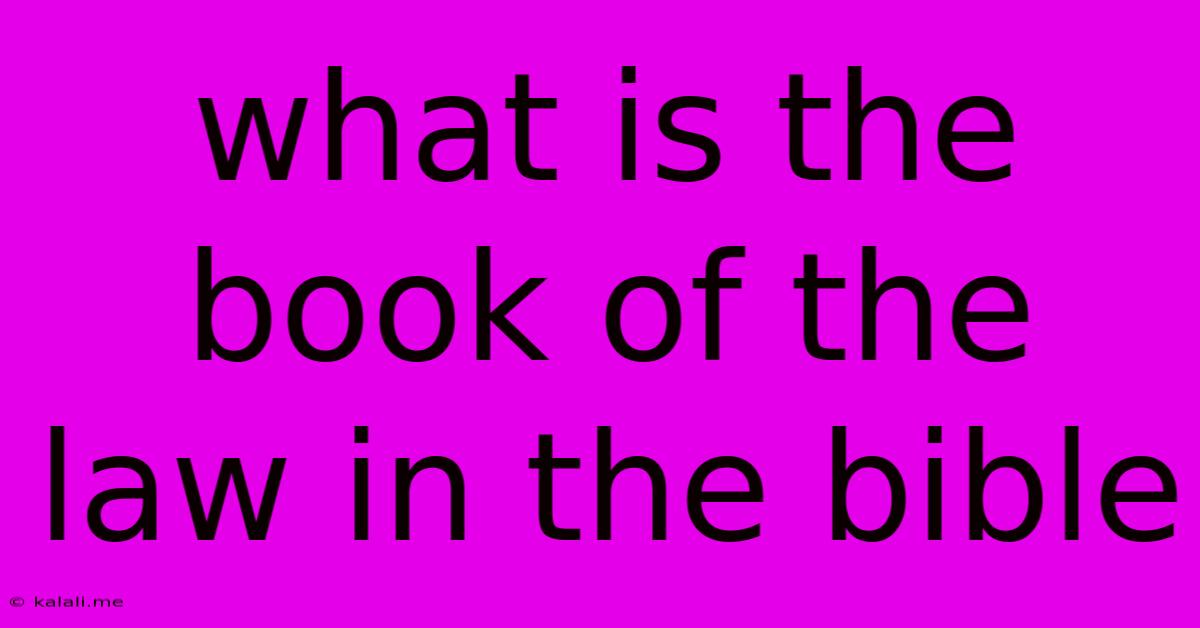What Is The Book Of The Law In The Bible
Kalali
May 24, 2025 · 3 min read

Table of Contents
What is the Book of the Law in the Bible? A Comprehensive Guide
The phrase "Book of the Law" in the Bible doesn't refer to a single, specific book like Leviticus or Deuteronomy. Instead, it's a broader term encompassing a collection of scriptures, primarily focusing on the Mosaic Law, that holds immense significance within the Judeo-Christian tradition. Understanding its various applications and interpretations across different biblical contexts is crucial for grasping its weight and relevance. This article will delve into the different understandings and applications of the "Book of the Law" throughout the Bible.
The Core Components of the Book of the Law:
While the precise boundaries vary depending on interpretation, the core of the "Book of the Law" typically encompasses the first five books of the Bible, also known as the Pentateuch or Torah. These books—Genesis, Exodus, Leviticus, Numbers, and Deuteronomy—contain:
- The Creation Narrative (Genesis): Setting the stage for God's covenant with humanity.
- The Exodus and the Covenant at Sinai (Exodus): Detailing God's liberation of the Israelites from slavery in Egypt and the establishment of the covenant at Mount Sinai.
- The Priestly Code (Leviticus): Outlining laws and regulations concerning ritual purity, sacrifices, and priestly duties.
- The Wilderness Wanderings (Numbers): Recounting the Israelites' journey through the wilderness and various events along the way.
- The Deuteronomic Law (Deuteronomy): Reiterating and summarizing the Law, emphasizing its moral and ethical dimensions, and preparing the Israelites for their entry into the Promised Land.
Different Interpretations and Uses of the Term:
The term "Book of the Law" appears throughout the Bible, often with subtle differences in meaning:
- In Deuteronomy: Deuteronomy itself is sometimes referred to as the Book of the Law (Deuteronomy 1:5, 31:9, 26:16). This reflects the book's central role in codifying and summarizing the Mosaic Law.
- In Kings and Chronicles: The phrase often describes a specific scroll containing the Law rediscovered during the reign of King Josiah (2 Kings 22:8; 2 Chronicles 34:14). This suggests a specific compilation of legal texts, possibly a copy of the Pentateuch or a selection thereof.
- In broader contexts: The phrase sometimes signifies the entire Mosaic Law, encompassing the moral, ceremonial, and civil regulations governing Israelite life. This emphasizes the comprehensive nature of God's instructions for His chosen people.
The Significance of the Book of the Law:
The Book of the Law served several crucial functions:
- Establishing God's Covenant: The Law established a covenant relationship between God and the Israelites, outlining their obligations and the blessings and curses associated with obedience or disobedience.
- Guiding Daily Life: The Law provided detailed instructions for various aspects of Israelite life, including worship, social justice, agriculture, and family relations. It aimed to create a just and righteous society reflecting God's character.
- Serving as a Witness: The Law served as a witness to God's faithfulness and the Israelites' covenant obligations. It acted as a constant reminder of God's promises and their responsibilities.
- Foundation for Subsequent Prophetic and Apocalyptic Literature: The Law served as a framework and source of interpretation for later biblical writings, influencing the prophetic messages, the wisdom literature, and the apocalyptic visions.
The Book of the Law and the New Testament:
The New Testament interprets the Law in a nuanced way. Jesus himself fulfilled and redefined aspects of the Law, emphasizing its underlying principles of love and justice while challenging interpretations that prioritized ritual over compassion. The concept of fulfilling the Law through faith in Jesus Christ is central to Christian theology.
In conclusion, the "Book of the Law" is not a single, easily definable entity but a multifaceted concept encompassing various texts and interpretations throughout the Bible. Understanding its different applications and historical contexts is crucial for appreciating its significance in both the Old and New Testaments, and its lasting impact on Judeo-Christian thought and practice.
Latest Posts
Latest Posts
-
How To Get Oil Out Of Concrete
May 24, 2025
-
This Is Considered A Philosophy Not A Religion
May 24, 2025
-
Does Airplane Mode Turn Off Location
May 24, 2025
-
Monthly Second Lowest Cost Silver Is Showing Zero
May 24, 2025
-
How To Breed Tropical Fish Minecraft
May 24, 2025
Related Post
Thank you for visiting our website which covers about What Is The Book Of The Law In The Bible . We hope the information provided has been useful to you. Feel free to contact us if you have any questions or need further assistance. See you next time and don't miss to bookmark.